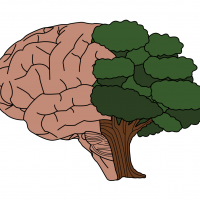Welcome
Research in the SANDLab — Semantics, Aphasia, and Neural Dynamics Laboratory — focuses on finding ways to improve the lives of individuals with acquired language disorders, with a primary interest in aphasia. Aphasia is a language disorder that occurs after a stroke or other acquired brain injury to the language dominant hemisphere of the brain. We are especially interested in ways to a) optimize behavioral therapy through the application of cognitive and linguistic theories; b) promote neuroplasticity by understanding the cognitive and neural underpinnings of successful therapy; and c) alleviate healthcare disparities by improving accessibility to optimized therapy. We use neuroimaging (fMRI, EEG) to help us understand what changes are taking place in the brain during successful therapy and how we can enhance these processes. We are also interested in a) how aging affects the way we interpret the cortical reorganization that occurs during language recovery; b) how to improve the quality and accessibility of treatment for bilingual aphasia; and c) how to improve access to mental health services for people with aphasia.
